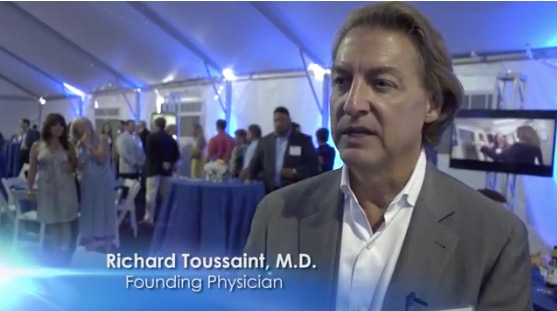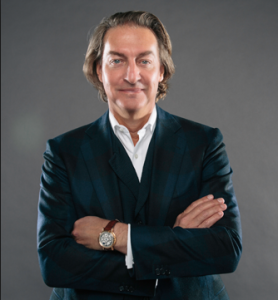Richard Toussaint, one of the men at the center of a multi-million dollar fraud scheme run through the defunct Forest Park Medical Center hospital chain he co-founded, has pled guilty to two counts of federal bribery and kickback charges in return for a prison sentence of no more than 10 years.
 His plea includes a bleak narrative of illegal kickbacks and bribes, promises of investment shares in return for patient referrals. Toussaint’s plea is the latest development in the yearslong collapse of the ultra-luxury chain, which careened into bankruptcy as a result of what federal investigators define as fraud, mismanagement, and a business model that relied on exorbitant out of network charges. Toussaint was the first domino to fall—the feds indicted him in May of 2015, alleging that he bilked Blue Cross Blue Shield of Texas, UnitedHealthcare, and the Federal Employee Health Benefits Program for $5 million in bogus claims. He was convicted in August. Then it went quiet. The hospitals gradually shuttered, one by one, and were purchased out of bankruptcy by Texas Health Resources, HCA North Texas, the Methodist Health System, and St. David’s in Austin.
His plea includes a bleak narrative of illegal kickbacks and bribes, promises of investment shares in return for patient referrals. Toussaint’s plea is the latest development in the yearslong collapse of the ultra-luxury chain, which careened into bankruptcy as a result of what federal investigators define as fraud, mismanagement, and a business model that relied on exorbitant out of network charges. Toussaint was the first domino to fall—the feds indicted him in May of 2015, alleging that he bilked Blue Cross Blue Shield of Texas, UnitedHealthcare, and the Federal Employee Health Benefits Program for $5 million in bogus claims. He was convicted in August. Then it went quiet. The hospitals gradually shuttered, one by one, and were purchased out of bankruptcy by Texas Health Resources, HCA North Texas, the Methodist Health System, and St. David’s in Austin.
In December 2016, more than a year after Toussaint’s indictment, the Department of Justice announced that 20 more suspects were being indicted on allegations of kickbacks and fraud. The feds included fellow co-founder Wade Barker; management company higher ups Alan Beauchamp and Wilton ‘Mac’ Burt; and well-known surgeons like Drs. William Nicholson, Shawn Henry, Michael Rimlawi, Douglas Won, and David Kim, the latter of which had his face splayed on billboards across Dallas-Fort Worth advertising his bariatric surgery practice. Mark Werbner, Barker’s attorney, said all of Toussaint’s claims are “tainted by his own misconduct,” referring to his separate conviction.
“People in his situation will say just about anything,” Werbner said. “Dr. Barker did not do anything wrong and the government is pressuring Toussaint to characterize legitimate marketing expenses as bribes and that is absolutely not the case. The only reason you see Toussaint making these allegations is because he’s been convicted of something else.”
Marketing was how many of the kickbacks were funneled, the feds allege. The plea deal includes what’s known as a factual resume—basically a narrative of the scheme that fueled Forest Park for so long, signed and verified by Toussaint. Taken with an internal memo drafted by the hospital’s in-house counsel and obtained by D Magazine, a full picture emerges of allegations that detail some of the company’s higher ups sinking the Forest Park business model through greed and fraud. Surgeons were paid millions of dollars in illegal kickbacks for patient referrals. The founders allowed high-referring surgeons to buy more investment units, allowing them to profit more from the revenue coming in, Toussaint says.
“Kim, in particular, would always laud the number of surgeries he was steering to FPMC when asking for more shares,” the feds say.
Toussaint alleges that Barker, a bariatric surgeon, had cooked up the scheme as far back as 2003 on his own, years before the creation of Forest Park. Barker began bringing Toussaint along to operations as his anesthesiologist, and Toussaint “noticed that Barker would always take his patients to the highest bidder, that is, the hospital that paid him the most to bring his patients to the facility,” according to the federal document. It’s illegal to pay for referrals, an act explicitly forbidden by the federal anti-kickback statute, which makes it a felony to solicit or receive anything of value for patient referrals. Barker, the document states, started off getting $5,000 to $10,000 in marketing fees per procedure, and began demanding those from hospital chief operating officers before he would book his surgeries. This is why he stayed away from larger systems—Texas Health Resources and Baylor wouldn’t pay and he knew it, the document says.
Barker met Beauchamp in one of these arrangements. Beauchamp was the COO at Vista Hospital, a “dumpy, beat up” facility near Garland, which Barker only used because of Beauchamp’s willingness to hand over a check directly to Barker for bringing patients there, the federal document says. Toussaint wasn’t comfortable with this arrangement, but the money was good, so he didn’t speak up.
Barker created a company called Moto Marketing to receive the inducement payments from the hospitals, and named his late uncle, Vaughn Dale Gares, its manager. His aunt and accountant, Darlene Rohrer, was also a member. Rohrer did not respond to requests for comment.
In 2008, Barker and Toussaint cooked up the idea for Forest Park: A hospital for elective procedures with a luxurious, spa-like atmosphere. The original plan was to secure in-network contracts with the hospitals, but “the out-of-network reimbursement rates were far more lucrative than Toussaint and others ever imagined.” FPMC refused to go in-network and began negotiating its own rates outside of contracts with the major insurance carriers. They put Beauchamp in charge of physician recruitment and hired Burt to run the management company for the hospitals, called Vibrant. Beauchamp soon started his own shell company called Adelaide, which was billed as a wholesale marketing firm, but was really a front to pay doctors for referrals, according to Toussaint’s plea.
The feds say the spigot began at $300,000 a month and sailed to $1.2 million a month. “The more volume of cases a surgeon had,” Toussaint agreed, “the more money he received.”
Jackson Jacob, 53, a co-defendant charged alongside Toussaint and Barker, managed this, distributing money to surgeons, primary care doctors, chiropractors, attorneys, and worker’s compensation specialists—anyone that could refer patients to the hospitals. According to the in-house document, Beauchamp is who directed Jacob: “Over the course of three and a half years, Beauchamp used Adelaide to direct more than $8 million to entities controlled by Dr. Wade Barker, including Moto Marketing,” the company run by his aunt and uncle. Meanwhile, the feds say Toussaint’s ethics had faded away:
“Toussaint was always uncomfortable when he saw Barker take his patients to the highest bidding hospital, but FPMC did the exact same thing.”
To keep the money flowing, Toussaint says that Forest Park didn’t “make a good faith effort” to collect out-of-network coinsurance from patients or reduced it to in-network levels. They didn’t tell the major carriers, either. Surgeons who became concerned that their patients would be bilked by the high out-of-network charges by the hospital got assured by Beauchamp that they’d pay the same rates as they would at in-network facilities.
Meanwhile, Toussaint and Barker began recruiting well known physicians into the scheme. They allegedly took bariatric surgeon Dr. William Nicholson to dinner, offering marketing dollars in exchange for sending his out-of-network patients to Forest Park. Nicholson also later invested in the system. They did the same with minimally invasive spine surgeons Drs. Michael Rimlawi and Douglas Won, who Toussaint says were receiving $100,000 a month for their referrals despite a non-compete clause with another hospital in town. Forest Park also only allowed one anesthesia provider: Ascendent, which was owned by Toussaint. Won and Rimlawi allegedly received a total of $7 million and $3.8 million, respectively.
Kim, who often advertised his bariatric services alongside former patient and Dallas Cowboy Nate Newton, agreed to be managed by Toussaint at Forest Park and received two dedicated operating rooms. He was allegedly paid $125,000 in 2011 and received a total $4.595 million as the years progressed.
Beauchamp also roped in spine surgeon Shawn Henry, who became a “consultant” to Barker and Toussaint’s real estate company that helped build the hospitals, the Neal Richards Group. He got $30,000 a month and didn’t submit a single invoice for the work he did. Toussaint and executives from the Neal Richards Group (none of whom have been accused of a crime), were uncomfortable with the deal, but Beauchamp allegedly insisted. According to the internal memo, Forest Park had paid $1.2 million to Neal Richards Group for consulting from 2009 to 2012.
“When Henry failed to provide Toussaint an invoice for the first months’ payment, Toussaint knew definitely that the payments were just a bribe to get Henry’s patients to FPMC,” reads the factual resume.
Once the money slowed, around 2012, the surgeons began fleeing. Kim, Won, Rimlaw, and Nicholson all stopped referring patients to Forest Park. Kim demanded to be bought out, despite receiving an extra $75,000 a month. According to the internal memo, Forest Park had been paying out too much. They ceased distributions from June 2012 to Feb. 2013. This triggered the financial meltdown that sunk the hospital chain, as detailed in this D CEO story from 2015. Nicholson’s attorney, Thomas Melsheimer, was out of the country on Friday but has told The Dallas Morning News that his client is not guilty of the charges against him.
Meanwhile, the internal memo details managerial chaos. Barker, it says, was voted off the board of directors at its Frisco hospital after attending the first two meetings and missing the subsequent 16. The rift continued as the hospital chain opened new locations and attempted to expand its policies—Fort Worth CEO Jim Davis allegedly refused to agree to use Ascendent solely for anesthesia services, which made Toussaint say he was “pulling all support” for the hospital. San Antonio also refused to use Ascendent, and Barker later refused to loan $1 million so the hospital could make payroll, an act that “crippled the San Antonio facility,” according to the internal memo. That hospital was later acquired by Texas Capital Bank following a bankruptcy auction.
Burt, the head of the management company, is accused of deleting files that the federal government ordered to be held: “Mr. Burt is well aware of the Department of Justice subpoena and document hold and has irresponsibly deleted these files to the harm of Forest Park.” Beacuhamp was also accused of sexually harassing employees, according to the internal document. Two Austin staffers compained, and HR launched an investigation: “The investigation uncovered a number of similar incidents with employees in Dallas, including employees whom Beauchamp demoted because they refused to reciprocate his sexual advances.”
Lawyers for Beauchamp, Burt, Kim, Rimlawi, and Won could not be reached Friday afternoon.





